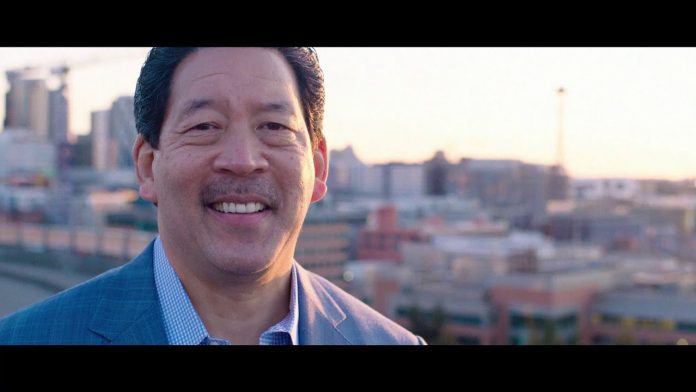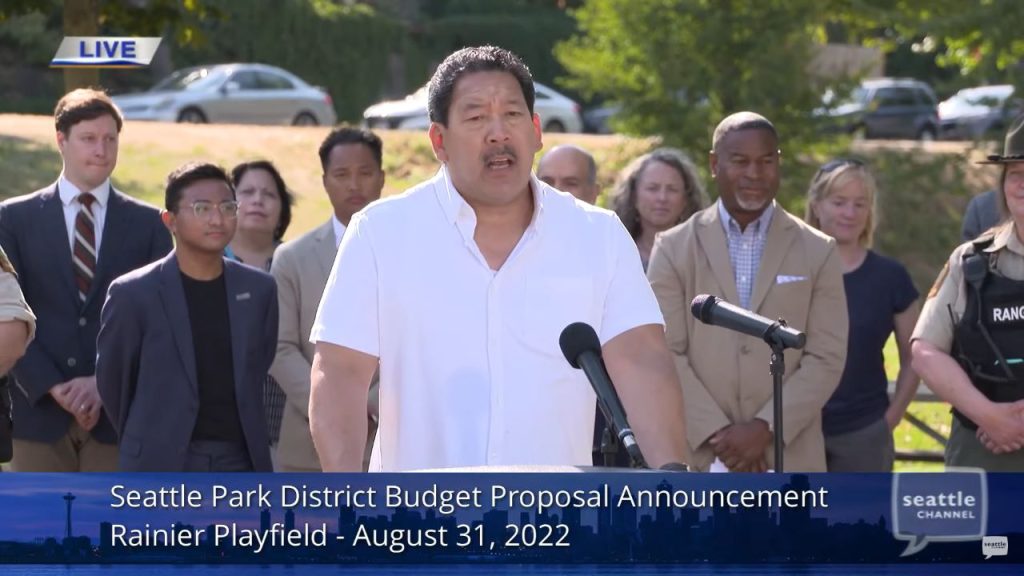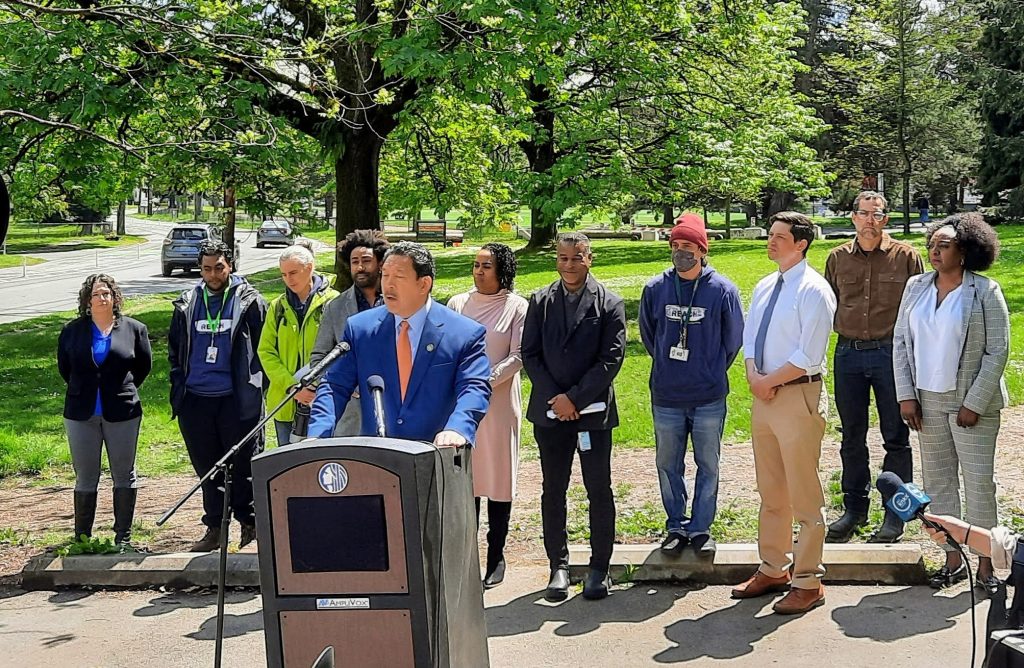
The cracks are showing in Mayor Harrell’s “One Seattle” brand as he pledged to unseat his enemies and withhold funding from the Regional Homelessness Authority unless they ramp up encampment sweeps.
Conservative talk radio host Jason Rantz published revealing quotes from Mayor Bruce Harrell on Monday that blamed everyone but himself for the problems facing Seattle. In them, the Mayor promised to campaign against his enemies on City Council, who he ridiculed for being “inexperienced” and having “thin” resumes.
“Quite frankly, I’m working on the city council races,” Harrell said per Rantz. “Seven are up next year. I’m looking at people running for office. I’m talking to the judges about some of their policies, and we’re looking at those races. Like I say, politics, I know politics, and this is not child’s play. In order to get the city on the right track, I have to be that tenacious. You don’t see mayors doing that. I’ve already talked to two potential candidates for city council. There’s nothing unethical about that. That’s what I can do. I choose to do that.”
The Urbanist reached out to the Mayor’s Office with follow-up questions about the Mayor’s remarks and to offer an opportunity to confirm or deny their veracity, but, like other publications, did not receive a response. The Mayor did touch on his comments when asked at a press conference announcing his Parks District Budget this morning, but claimed to not remember exactly what he said.
“A couple of them… their resumes are quite thin. I say that as a nice way to say they’re inexperienced,” Harrell reportedly said.
Harrell sought to defuse his comments by admitting he also is inexperienced as mayor, but he did confirm he had conversations with some candidates seeking to challenge the incumbents and said some weren’t getting the job done. He declined to specify which councilmembers he was hoping to oust. The Stranger has since reported that the Seattle Metropolitan Chamber of Commerce (which backed Harrell) is targeting Councilmembers Lisa Herbold (District 1) and Tammy Morales (District 2) and sought to recruit Meta/Facebook lawyer Rob Saka and Chukundi Salisbury to be their respective opponents.
The pledge to oust and undermine colleagues stands in sharp contrasts to the “One Seattle” brand the Mayor has sought to maintaining in official appearances and while campaigning for office, namely as a collaborative leader who would unite the city, heal divisions, and protect the vulnerable. During Harrell’s lofty inaugural address, he struck a much different tone than he recently did while seeking to curry favor from police officers during roll calls ahead of a big vote to approve the Seattle Police Officers Guild (SPOG) contract his administration is negotiating and promising will be done by year’s end.
“Today begins our journey to bring new energy and resources to address homelessness, public safety, gun violence, climate change,” Mayor Harrell said in his inaugural speech. “We do this not by denigrating or shouting down those before us or around us. We listen — because there are so many who give their lives, commitment and passion to this work. As your Mayor, I will lead by example, making no excuses and implementing ideas that work; by being bold enough to innovate and take risks, and humble enough to embrace ideas put forth by others.” [emphasis added]

A reporter asked if Seattleites should doubt the sincerity of his One Seattle rhetoric. “The short answer is no,” Harrell said, pivoting to the problems like rising murder rate, crime, and the fentanyl crisis that he wants to tackle, but have continued to get worse so far. “I can’t keep track of everything I’ve said,” Harrell added. “I am committed to transparency… Whatever I said I will own it.”
“Seattle, stop playing small ball; let’s play big ball,” Harrell said. “Let’s attack racism, police reform, and revitalize our downtown. That’s big ball.”
Harrell said that he called “anyone who had been affected” by his off-the-cuff remarks and had “good conversations, because these are my friends.” At the same time, Harrell seemed to maintain that he didn’t really have anything to apologize about, noting he didn’t swear or “cuss anybody out.” (Only threaten to end their political careers or starve their organizations of resources — totally normal friend stuff.)
Harrell voted to launch Regional Homelessness Authority he’s threatening to cut
Mayor Harrell also criticized the King County Regional Homelessness Authority (KCRHA) and threatened to pull funding. This morning, he seemed to reiterate he would be proposing a reduction in Seattle’s contribution to the KCRHA’s budget and called it a “start-up organization,” but praised its work and said “they are owed the opportunity to succeed.” After the press conference, he clarified his initial yes was only meant to acknowledge the question not to say yes, he was going to cut their budget.

Oddly, when addressing police officers, Harrell claimed to have no part in setting up the authority despite making establishment of the KCRHA one of his final acts as a councilmember in the lame-duck period of December 2019.
“I didn’t set this stuff up. I get one vote out of nine, and they criticize my removal efforts. So I’m funding an organization that seems to be working against what I’m trying to do,” Harrell said. “So now we’re looking to revisiting that because my public safety strategy that I’m funding … they criticize that. So why would I then, as mayor, invest $118 million into a group that’s really working against me? That’s the hand that I’ve dealt.”
That measure passed 5-1 with three Councilmembers (Teresa Mosqueda, Lisa Herbold, and Kshama Sawant) absent, which means Harrell could have blocked the measure, if he cared to, though that would have required anticipating the issues ahead of time and taking a tough vote. Harrell’s close allies — former Mayor Jenny Durkan, then-Councilmember Sally Bagshaw, and Councilmembers Debora Juarez and Alex Pedersen backed that legislation. Meanwhile, Harrell rival Lorena González provided the lone vote against, arguing that Seattle would remain on the hook for the bill, but hand control of the decisions to a body controlled by suburban policymakers.
“The city of Seattle has been very generous in subsidizing the needs of non-Seattle residents,” González said ahead of the vote. “And yet that reciprocity is pretty much nonexistent in terms of how this deal is structured.”
This is the exact problem Harrell lamented at police roll calls.
Harrell went with the centrist crowd, although he now apparently regrets the decision. Ironically, Mayor Harrell portrayed González as a lightweight on homelessness who had led the city down the wrong path when the two squared off in 2021 mayoral race. Now, he seems to wish he voted like her in December 2019 and followed her policy instincts. “I’m funding them 70%, over $118 million. And I have no control over them. I’m one of nine on the board,” Harrell told police officers.
Similar to his criticisms of the Regional Homelessness Authority, the impetus for the Council shakeup he’s seeking appeared to be to ramp up the pace of homeless sweeps, which have already been up significantly since Harrell took office. Still, Harrell lamented that City departments aren’t in unison toward the goal of conducting even more homeless sweeps, or “removals” or “resolutions” in the Mayor’s more sanitized language.
“While he says he’s used to being criticized by the press, he complains that KCRHA leadership stands in his way,” Rantz wrote, summarizing the Mayor’s comments. “Given the financial support, the city of Seattle offers, he expects some support.”
Mayor dances around legality and effectiveness of encampment sweeps
Although he’s a decorated lawyer with a law degree from the University of Washington, Mayor Harrell’s comments dismissed the constitutional rights of people experiencing homelessness, which were reaffirmed in the Martin v. Boise 2019 ruling in the Ninth Circuit Court of Appeals.
“They still take shots at me on my homelessness strategy, because I, quite frankly, I don’t think anyone has a right to sleep in a public space. I don’t think anyone has a right to sleep on a sidewalk and I don’t think anyone has the right to sleep in the park.”
Ensuring there are enough shelter beds for homeless people before sweeping them is a frequent holdup for the Mayor’s sweeps, but it is also a legal obligation, like it or not. And “freaking syringes” in parks he lamented in precinct talks doesn’t provide a legal shortcut to retract that right, as the Mayor contended while trying to backpedal today.
Even if Mayor Harrell denies those rights on a personal basis, governing the city that way could expose the city to lawsuits that would prove costly to litigate. Likewise, pulling funding from the KCRHA could also backfire and lead the County to also decrease their investments in homelessness services and discourage suburbs from contributing in a race to the bottom.
For those hoping Seattle can chart a course out of the homelessness crisis instead of pointing fingers at each other, the Mayor’s comments troublingly hint at a lack of vision or a cohesive strategy to get there. A housing dashboard, like Harrell rolled out in late May, doesn’t constitute a full-pledged plan, and dashboard remains incomplete and sporadically updated. The Mayor was all too happy to paint the City departments he inherited as adrift and lacking a plan. Diagnosing a problem as a candidate is easy. Getting things back on course as mayor when the buck stops with you is harder.
The Harrell administration has ramped up encampment sweeps, but encampments keep on cropping up in new locations since the region still lacks enough supportive housing to house everyone who is unhoused and lacks a fix for the grinding housing affordability crisis that keeps driving more people into homelessness.
Not every decision has centered on that goal either. Siding with landlords, Mayor Harrell opted to end the city’s eviction moratorium in February, ending protections that shielded many people from homelessness during the pandemic. Likewise, tentative plans to ease microhousing restrictions and reform Seattle’s lengthy and unpredictable design review process have been slowwalked with no clear plan in sight.
Mayor wants to end consent decree, calls SPD “world-class”
At the press conference today, Harrell reiterated that he wanted to end the federal consent decree that the Seattle Police Department is under, as he told police officers according to leaked comments.
Harrell has had a wide variety of positions on the consent decree during his long political career, sometimes urging embrace of federal oversight to further reform and other times bristling at criticism of a police department he has defended. At recent roll calls when he and Senior Deputy Mayor Monisha Harrell called SPD a “world-class” police department.
In 2011, as the consent decree agreement was being negotiated, then-Councilmember Harrell criticized Mayor Mike McGinn for not settling and signing the agreement sooner and urged a collaborative approach with the Department of Justice. Mayor McGinn did ultimately sign the consent decree, but said he was holding out to get more citizen oversight, not to block reform.
In 2013, as Harrell was running for mayor and perhaps rebranding himself, he flipped his position and sided with SPD to claim the DOJ data was exaggerated and the city should seek litigation to force the federal government to release the underlying data hoping to prove it was faulty, as Seattle Times columnist Johnathan Martin highlighted. After taking some heat for the flip-flop, Harrell backpedaled and said the litigation was intended to open police officers’ eyes and get buy-in for reform, rather than his earlier suggestion that SPD’s well-documented excessive force issues were exaggerated.
“Harrell’s current argument is incoherent,” Martin wrote in 2013. “If he’d been mayor, Harrell says he would have spent political capital on an unpopular litigation strategy in order to force his officers to face their colleagues worst behavior. That’d be a very odd way to get ‘buy-in’ from his officers.”
On the 2021 campaign trail, odd ways to get buy-in from police officers continues to be theme for the Mayor. Harrell said he’d require police officers watch the entire nine-minute video of George Floyd being murdered by Minneapolis police officers to underscore the importance of reform and measured use of force. When asked if that’d be traumatic and triggering for officers of color, he then walked it back to an optional request rather than a requirement. He also recommended throwing celebrations in police precincts every Friday on weeks that police do not kill African Americans as means to promote culture change at SPD. There’s been no indication those ideas have been implemented in Harrell’s first eight months in office.
It doesn’t appear SPD is any more bought-in to police reforms after a violent 2020 police crackdowns that included police targeting protestors, medics, and journalists with tear gas, and the SPOG president and several police officers backing Trump’s coup attempt in 2021. Still both Mayor Durkan and Harrell have sought to get Seattle ought of the consent decree, but are so far unsuccessful.
Fast forward to today and Mayor Harrell has yet to announce his pick for police chief; he confirmed he freshly ousted his Director of Public Safety Andrew Myerberg, and he has an unclear strategy to guarantee police reforms are advanced in the new police contract. This is concerning since the last contract, signed in 2018, retracted accountability measures. Already on an upward trend, murders are spiking this month. August has been the deadliest month since 2008, and the Mayor is casting blame elsewhere in one breath, while boasting of a strong, decisive, collaborative “big ball” approach in another.
In his comments to police officers, Harrell criticized the Law Enforcement Assisted Diversion (LEAD) program saying “with all due respect to [the program’s lead architect] Lisa Daugaard” the program isn’t achieving desired outcomes. Program evaluations done by University of Washington program have repeatedly shown that LEAD lowers the chance people commit crimes in the future and lessens costs to government compared to incarceration. Today, he walked back that statement and implied it was a tool the City should continue to use.
Councilmembers take high road
Seattle City Councilmembers, for their part, have taken the high road thus far, even as Harrell harangued some of them as “thin” resume lightweights he would campaign against next year.
“Mayor Harrell has been great to work with,” Councilmember Andrew Lewis said in a statement to KIRO 7. “We’ve accomplished a lot on homelessness and public safety in the last month. He’s done nothing but act in good faith, and I have no reason to believe that will change.”
Likewise, Councilmember Dan Strauss, another first-termer, has frequently appeared with the Mayor and gushed with praise for the Harrell administration’s more collaborative approach. Both Strauss and Lewis were elected as labor-backed progressives, in contrast to the pro-business centrist coalition backed Mayor Harrell and swept him into office last year. It doesn’t appear their overtures to the Mayor is going to spare them from being targeted by the Mayor and the centrist machine that elected him.
The KCRHA, for its part, looked ahead to the shared goals and collaborative work rather than getting baited into the infighting the Mayor had indicated.
“With our partners, we are working to create vibrant, inclusive communities where everyone has a safe and stable place to live, and we can accomplish that goal when we work together,” the King County Regional Homelessness Authority said in a statement responding to the Mayor’s comments.
Whether the working together continues in earnest remains to be seen.
“At the end of the day, I think people are going to want a mayor to make decisions,” Harrell concluded his press conference. “To not be afraid make tough decisions. To try to uplift people, but I think I have to maintain a certain level of remaining objective. Critical thought, critical thinking. It’s going to make us all better. I try to do it in a way that I’m not offending anyone personally.”
Just what those decisions are is anybody’s guess.
Update: This article has been updated with the The Stranger report on the two Councilmembers being targeted by the Chamber.
Doug Trumm is publisher of The Urbanist. An Urbanist writer since 2015, he dreams of pedestrian streets, bus lanes, and a mass-timber building spree to end our housing crisis. He graduated from the Evans School of Public Policy and Governance at the University of Washington in 2019. He lives in Seattle's Fremont neighborhood and loves to explore the city by foot and by bike.

